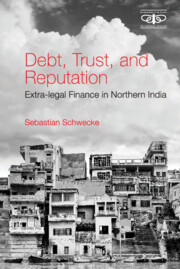3 - Discretion
Published online by Cambridge University Press: 30 November 2021
Summary
The fact is lost sight of that besides minors, females, idiots and others legally incapable of making contracts, except under certain safeguards, there are millions of illiterate persons in this country who are quite as incapable mentally and morally, and ought to be equally incapacitated by law.
The decision to repeal the usury laws in British India did not remain uncontested, not only by protesting farmers, but also in the legislatures and courts. While one of its effects certainly was to enhance the importance attributed to the written form of contracts, the actual practice of debt relations in Indian society remained to some extent unaffected by it. The vast majority of debt contracts did not lead to litigation. Instead, moneylenders frequently relied on written contracts and court litigation either as a last resort in cases of default or to ‘fleece’ debtors once the accumulation of interest payments had led to default. The Deccan Riots formed a major threshold in the development of British Indian policy, especially in the development of law and legal interpretation. Yet the comprehensive sway of the Benthamite doctrine on the futility of usury laws had been challenged even before, especially in tenancy laws. Thus, for instance, the Bengal Landlord and Tenant Procedure Act of 1869 (Act VIII B. C. of 1869), concerning the procedure of suits between landlords and tenants, in Section 21 provided an interest rate of 12 per cent per annum for arrears in rent, unless otherwise provided for by written contract. Read together with Section 67 of the same act, stipulating the signing of a kabuliyat for outstanding arrears in rent for transfers of landed property between tenant and (new) landlord, the act in practice imposed an effective maximum interest rate for a significant number of debt relations.
The effects of legal measures on the actual practice of debt relations should not be overstated as even where suits were instigated, especially the subordinate courts were unlikely to employ this legal reasoning to set aside the evidence of a written contract. The case of the aforementioned act, however, emerged as one of the early cornerstones in the development of legal doctrine regarding debt cases.
- Type
- Chapter
- Information
- Debt, Trust, and ReputationExtra-legal Finance in Northern India, pp. 66 - 101Publisher: Cambridge University PressPrint publication year: 2022



